PRINCETON, NJ -- A new USA Today/Gallup poll finds three-quarters of U.S. women aged 35 to 75 disagreeing with the more relaxed medical recommendations on mammograms that were announced by a government advisory panel last week, including 47% saying they "strongly disagree" with them.
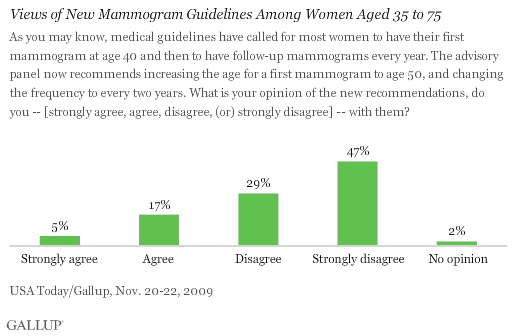
The poll was conducted Nov. 20-22 and includes interviews with 1,136 women aged 35 to 75 nationwide.
Most women surveyed are also skeptical about the reasoning behind the panel's recommendations that women should delay getting their first mammogram until the age of 50 (rather than the longstanding recommendation of 40 years old) and that the interval between routine mammograms should be every two years (rather than every one year). A majority of women surveyed believe the panel made its decisions based primarily on the potential cost savings (76%) involved, rather than on a fair assessment of the true risks and benefits (16%) of mammograms for women in their 40s.
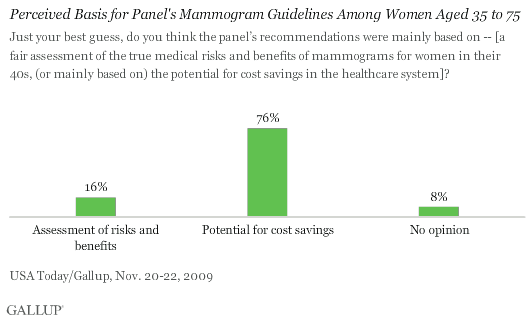
Not only do women disagree with the panel's recommendation to delay starting mammograms until the age of 50, but most of those in the key age group targeted by the decision -- those aged 35 to 49 -- plan to ignore them. Specifically, 84% say they will not wait until they are 50 to get their next mammogram, but they will get one sooner than that. The finding is the same for women aged 35 to 39 as for those aged 40 to 49.
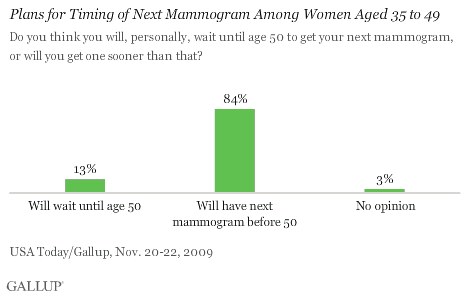
News Has Spread Quickly
The U.S. Preventive Services Task Force -- a panel of medical experts commissioned by the federal government to review the scientific evidence regarding preventive medical services and develop practice guidelines -- made its announcement about changes to mammogram screening last week. Already, 85% of women in the 35- to 75-year-old age bracket say they have heard about the new recommendations.
Among women 35- to 75-years-old who have heard of the recommendation, the slight majority (57%) correctly state that the panel advises most women to receive their first mammogram at the age of 50. About half as many (29%) incorrectly believe the recommended age is younger than 50, while 14% are unsure.
The Stress Factor Is Real
The task force cites the stress that some women experience from false-positive mammogram results as a significant factor in arriving at its new breast cancer screening recommendations. The report states that the health risks of stress combined with the medical risks of unnecessary biopsies and other follow-up tests led the task force to conclude that the benefits of routine mammograms do not outweigh the risks for women in their 40s.
The new poll verifies that such mammogram-induced anxiety is not uncommon. Among women aged 35 to 75 who have had a mammogram (but not been diagnosed with breast cancer), 15% report that at least one mammogram experience was very stressful for them. Another 29% say that at least one mammogram experience was somewhat stressful.
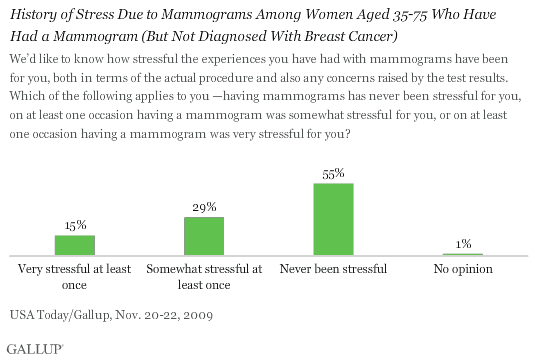
The new USA Today/Gallup findings suggest women who have had very stressful mammogram experiences may be more inclined to agree with the task force's reasoning than those who have not had such scares. However, the vast majority of women in all stress groups disagree with the new guidelines.
Sixty-six percent of women who have had at least one very stressful mammogram experience say they disagree with the new mammogram guidelines. This compares with 81% of those who have had a somewhat stressful experience and 78% of those who have never had any kind of stressful mammogram experience.
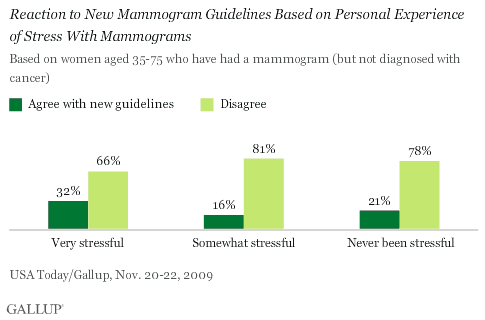
Bottom Line
Women have been told for years that their best protection against breast cancer is early detection, starting with getting their first mammogram at the age of 40 and faithfully scheduling yearly updates. Their reaction to the news that this may not have been the best advice after all is one of disbelief, perhaps fueled by skepticism about the motive. For now, most women under the age of 50 believe it is in their best interests to have their next mammogram before they reach the new recommended age threshold, and they intend to do just that.
Sign up for Gallup e-mail alerts or RSS feeds
Get Gallup news on Facebook and Twitter
Survey Methods
Results are based on telephone interviews with a random sample of 1,136 women, aged 35-75, conducted Nov. 20-22, 2009. For results based on the total sample of women, one can say with 95% confidence that the margin of error is ±4 percentage points.
For results based on the 981 women aged 35-75 who have had a mammogram, the margin of sampling error is ±4 percentage points. For results based on the 284 women aged 35-49 who have not been diagnosed with breast cancer, the margin of sampling error of ±7 percentage points.
Interviews are conducted with respondents on landline telephones (for respondents with a landline telephone) and cellular phones (for respondents who are cell phone only).
In addition to sampling error, question wording and practical difficulties in conducting surveys can introduce error or bias into the findings of public opinion polls.
